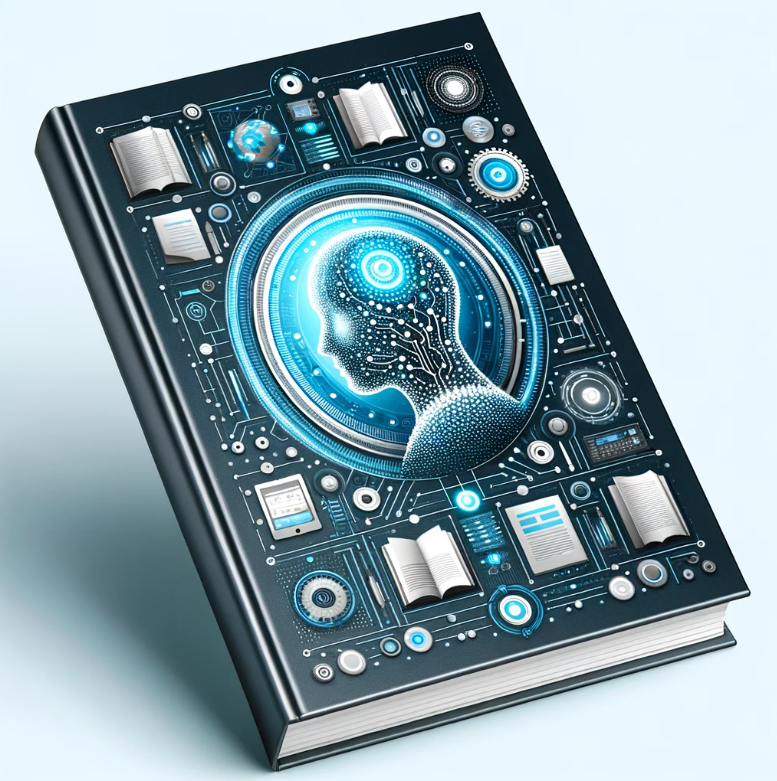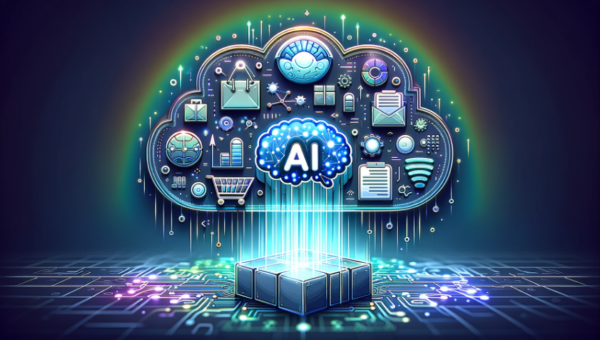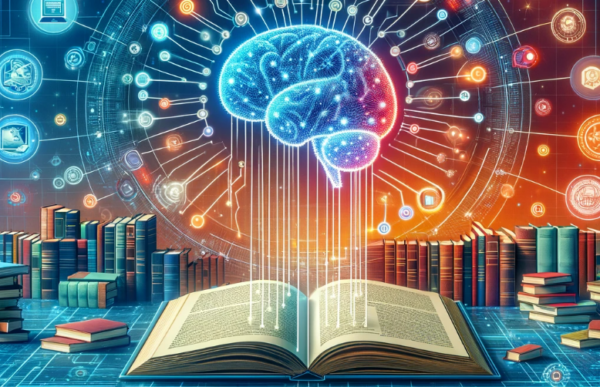In the rapidly evolving realm of marketing, Artificial Intelligence (AI) stands as a monumental game-changer. Its integration into marketing strategies has revolutionized how businesses connect with and understand their audiences, leading to more effective and efficient campaigns.
This technological advancement is particularly pivotal in the literary world, where the challenge of standing out in a saturated market is more daunting than ever. In the digital age, book marketing transcends traditional boundaries, leveraging digital platforms and innovative strategies to reach a global audience. For authors, this means adapting to a landscape where AI-driven strategies are not just advantageous, but essential.
AI-driven book marketing strategies harness the power of machine learning, data analytics, and AI-powered tools to offer more personalized, targeted, and impactful marketing efforts. From analyzing market trends to understanding reader preferences, AI provides actionable insights that can significantly enhance the effectiveness of marketing campaigns.
For authors, this means a shift from generic advertising campaigns to highly personalized approaches that resonate with their specific target audience. In this article, we delve into the fascinating world of AI-driven book marketing, exploring how authors can harness these powerful tools to amplify their reach, connect more profoundly with readers, and ultimately achieve greater success in the competitive landscape of the literary world.

The Evolution of Book Marketing: Embracing Artificial Intelligence
The journey of book marketing has been a tale of constant evolution, adapting to the changing landscapes of technology and reader habits. Historically, traditional book marketing strategies heavily relied on physical book tours, print media advertising, and word-of-mouth recommendations.
These methods, while effective in their era, were often limited by geographical boundaries and the inefficiencies of broad-spectrum targeting. The emergence of the digital age heralded a seismic shift in these strategies, paving the way for more innovative, expansive, and targeted approaches.
As the world embraced digitalization, the literary world was not far behind. The digital landscape opened new avenues for authors and publishers, offering platforms like social media, blogs, and online bookstores that transformed how books are marketed and purchased.
Your Publishing Journey Awaits – Start NowThe introduction of eBooks and audiobooks further diversified the market, broadening the scope and reach of book marketing efforts. However, with these advancements came the challenge of cutting through the noise in an increasingly crowded digital space.
Enter Artificial Intelligence (AI). AI’s integration into book marketing has been a game-changer, offering tools and techniques that provide a level of precision and personalization previously unimaginable. AI-powered tools utilize data analytics, machine learning, and predictive algorithms to gain deep insights into reader preferences, behaviors, and trends.
This data-driven approach allows for the creation of highly personalized marketing campaigns, targeted advertising, and even the generation of AI-driven insights for content creation and book cover design.
Moreover, AI’s role in understanding and segmenting audiences has been crucial. By analyzing vast amounts of data, AI helps in identifying and targeting specific reader demographics, and tailoring marketing messages to resonate more deeply with different groups. This level of customization ensures that marketing efforts are not just seen but are impactful, fostering a deeper connection between the book and its potential readers.
In summary, the evolution of book marketing, from its traditional roots to its current AI-driven form, reflects a broader shift in how the literary world interacts with and understands its audience. AI has not only enhanced the efficiency and effectiveness of marketing strategies but has also opened doors to new possibilities, making it an indispensable tool in the arsenal of modern book marketers.
AI-driven book marketing strategies: A Game Changer for Authors
AI-powered book marketing strategies represent a significant leap from traditional approaches, offering a level of sophistication and personalization that was once unattainable. These strategies leverage AI’s capability to analyze large datasets, drawing insights about reader preferences, market trends, and effective communication methods.
For instance, AI can examine past purchasing behaviors and online engagement to determine what type of books a specific demographic is likely to buy, or what marketing messages they are most responsive to.
Personalization: The Heart of AI Marketing
One of the most significant advantages of AI in marketing is its ability to create highly personalized campaigns. Unlike the one-size-fits-all approach of traditional marketing, AI allows authors and publishers to tailor their messaging and content to suit the unique interests and preferences of different reader segments.
This could mean customizing email marketing content based on the reader’s past interactions, or using AI algorithms to recommend books to readers based on their reading history. Personalization extends to advertising as well, with AI tools optimizing ad placements and content to target potential readers more effectively.
Targeting the Right Audience
The true power of AI in book marketing lies in its ability to accurately identify and target the right audience. By analyzing data points such as browsing history, purchase patterns, and even social media activity, AI tools can identify potential readers with a high level of precision.
This capability ensures that marketing efforts are not wasted on uninterested parties, but are focused on those most likely to engage with and purchase the book. AI’s advanced targeting can not only improve the efficiency of marketing campaigns but also enhance the reader’s experience by connecting them with books that align with their interests.
In conclusion, AI-powered book marketing strategies offer authors a powerful tool to reach and engage their target audience. By leveraging AI for personalized campaigns and precise targeting, authors can navigate the competitive literary market more effectively, ensuring their books find their way into the hands of readers who will truly appreciate them.
Targeted Marketing Campaigns: Just a Few Examples of AI-Driven Strategies
Crafting Effective AI-Driven Campaigns
Creating effective marketing campaigns in the era of AI involves a blend of data-driven strategy and creative execution. AI tools analyze a vast array of data, from browsing habits to purchase history, providing invaluable insights into consumer behavior.
Authors can use these insights to develop targeted campaigns that resonate with specific audience segments. For instance, AI can help in determining the best time to release a book based on historical sales data or identify the most engaging content types for different social media platforms.
Machine Learning and Chatbots in Marketing
Machine learning, a subset of AI, plays a crucial role in optimizing marketing campaigns. It enables the analysis of patterns and trends in large datasets, continually improving the accuracy of predictions and recommendations. This adaptive learning process ensures that marketing strategies evolve in response to changing reader preferences and behaviors.
AI-powered chatbots represent another innovative tool, enhancing customer engagement and providing personalized experiences. These chatbots can interact with potential readers on websites and social media platforms, offering personalized book recommendations, answering queries, and even assisting in the purchasing process. This direct and interactive form of marketing not only increases engagement but also builds a connection between the author and the readers.
Your Publishing Journey Awaits – Start NowSuccess Stories in AI-Driven Marketing
Several authors and publishers have reaped significant benefits from AI-driven targeted marketing campaigns. For example, a debut novelist might use AI to identify and target readers who have shown interest in similar genres or themes, resulting in a highly successful launch campaign.
Another case could involve using AI to analyze social media trends, enabling an author to create viral content that boosts book sales. These examples demonstrate the effectiveness of AI in crafting marketing campaigns that are not only targeted but also adaptable to the dynamic nature of reader interests and market trends.
In summary, targeted marketing campaigns are at the core of AI-driven book marketing strategies. By leveraging machine learning and AI-powered tools like chatbots, authors can create more effective, personalized, and engaging marketing campaigns, leading to higher success rates in the competitive world of book publishing.
Beyond the Book: AI’s Role in Promotional Materials and Social Media Posts
AI in Designing Book Covers and Promotional Materials
The visual appeal of a book cover or promotional material plays a crucial role in attracting potential readers. AI has revolutionized this aspect of book marketing by offering advanced design tools that can create visually striking and market-relevant book covers and promotional graphics.
These AI tools analyze current trends, genre-specific elements, and reader preferences to suggest design elements that are more likely to appeal to the target audience. For instance, an AI system can recommend color schemes, fonts, and imagery that have historically resonated with fans of a particular genre, ensuring the book stands out in a crowded market.
Enhancing Social Media Posts with AI
Social media is an indispensable platform for book marketing, and AI significantly amplifies its effectiveness. AI-powered tools can analyze the performance of previous posts to determine the most engaging content types, optimal posting times, and effective hashtags for different audience segments.
This data-driven approach ensures that each post reaches its intended audience and engages them effectively. Additionally, AI can generate creative content for posts, such as compelling captions or interactive content, further enhancing reader engagement.
AI-Driven Strategies for Online Presence and Engagement
Maximizing online presence and reader engagement in the digital age requires more than just posting content; it requires a strategic approach powered by AI. Tools like AI-driven analytics platforms can track reader engagement across various digital channels, providing authors with insights on how to refine their online presence.
AI can also assist in segmenting audiences and personalizing interactions, making readers feel more connected to the author and their work. For example, AI algorithms can help in creating targeted email marketing campaigns or personalized recommendations, making each reader’s experience unique and more engaging.
In conclusion, AI plays a significant role in enhancing promotional materials and social media strategies for book marketing. By employing AI in the design of book covers and promotional content, and in crafting effective social media strategies, authors can significantly boost their online presence, engage more effectively with their audience, and ultimately drive more book sales.
Looking Ahead: The Future of Book Marketing in an AI-Driven World
Anticipating Future Trends in AI-Driven Marketing
The future of book marketing in an AI-driven world is poised for exciting developments. Predictive analytics and machine learning will continue to evolve, providing even more nuanced insights into reader behaviors and preferences.
We can anticipate a rise in the use of AI for dynamic pricing strategies, where the price of books could be optimized in real-time based on demand, competition, and reader interest. Additionally, AI’s role in content creation will likely expand, possibly aiding authors in generating initial drafts or creative content based on trending themes and reader desires.
Another emerging trend could be the integration of AI with augmented reality (AR) and virtual reality (VR) for immersive marketing experiences. Imagine virtual book launches or author meet-and-greets in a VR environment, offering readers a new way to engage with their favorite books and authors. The use of AI in these advanced technologies will create unique and memorable experiences, further deepening reader engagement.
The Imperative for Adaptation and Innovation
For authors and publishers, staying ahead in this AI-driven landscape will be crucial. It will require a mindset that embraces continuous learning and adaptation to new technologies. Keeping abreast of AI developments and experimenting with new tools and strategies will be essential to remain competitive and relevant in the market. This ongoing adaptation is not just about leveraging technology but also about understanding the changing dynamics of reader interactions and preferences in the digital age.
Your Publishing Journey Awaits – Start NowEmbracing AI in Book Marketing: A Transformative Journey
Incorporating AI into book marketing strategies marks the beginning of an enlightening journey for authors and publishers. It opens up a world of possibilities where marketing is not just about promoting a book but creating a personalized and engaging experience for each reader.
As AI technology continues to advance, it will undoubtedly unlock new creative avenues and marketing strategies, making the act of promoting and enjoying literature more interconnected and immersive.
The future of book marketing in an AI-driven world is not just about adapting to technological changes; it’s about embracing a new era of creativity, personalization, and reader-centric approaches that will redefine the literary landscape.







